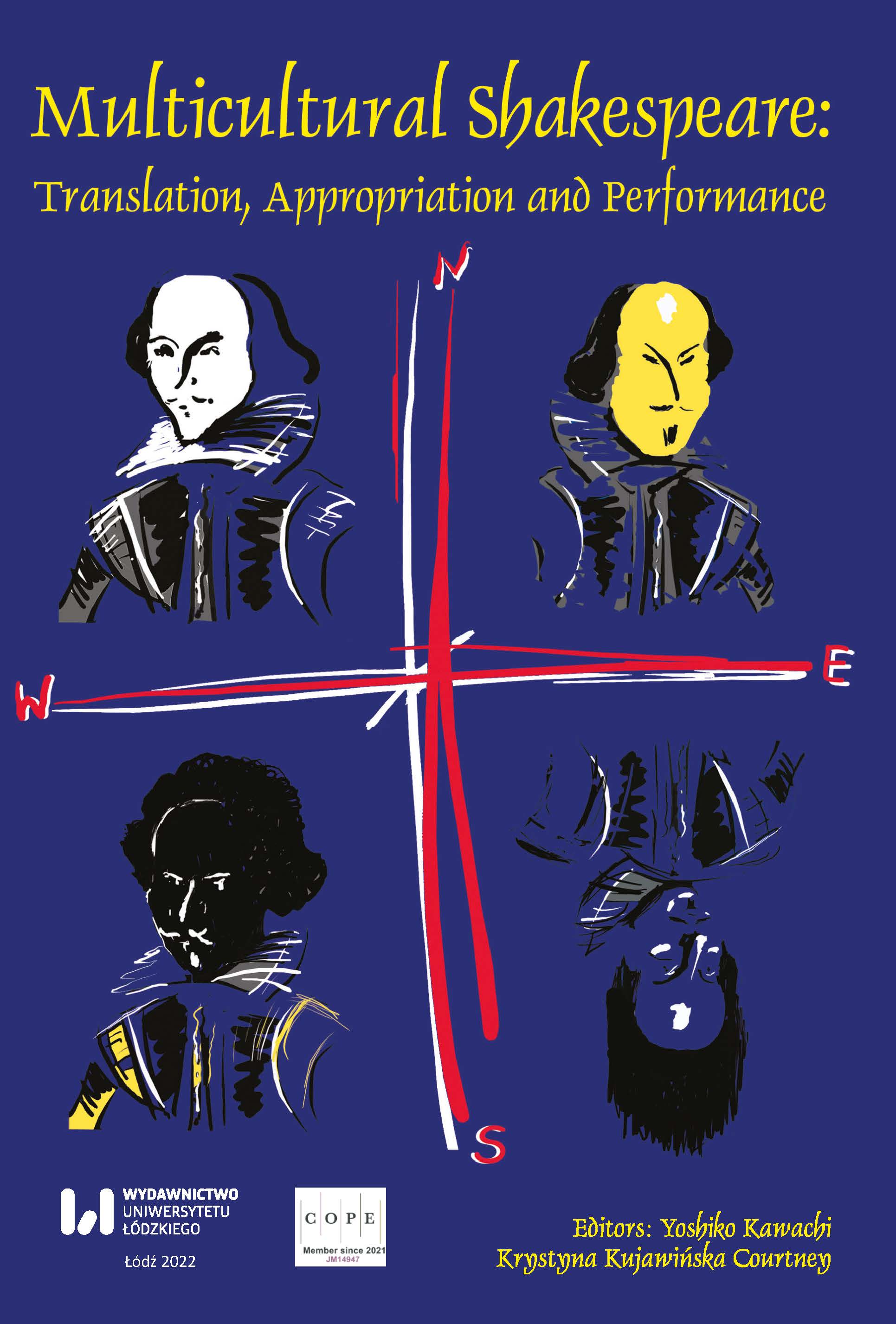Staging Dystopian Communities: Reimagining Shakespeare in Selected English Plays
DOI:
https://doi.org/10.18778/2083-8530.26.07Keywords:
Shakespeare, English Drama, adaptation, Edward Bond, Frank McGuinness, David GreigAbstract
Among the countless afterlives of William Shakespeare’s playwriting there is a strong presence of his visions of state and political powers. In universal, philosophical ways Shakespeare was addressing issues concerning the state power, social organization, hierarchy, and rank in what inevitably were the origins of modern, capitalistic societies. Therefore, many of his powerful images resonate today in the works of contemporary writers who intend to compose stories of utopian or dystopian character which diagnose the condition of modern society. This article aims to present three plays by post-war English dramatists (Edward Bond’s Bingo, Frank McGuinness’s Mutabilitie, and David Greig’s Dunsinane) which reuse Shakespearian themes, motifs, or characters to build politically contentious and subversive plots within a narrower context of their specific cultures, societies, and historical periods. It is assumed that the Shakespearean legacy the writers engage with is not merely a dramatic text, but a complex cultural structure of accumulated narratives, interpretations, and myths which contemporary dramatists rewrite and recycle. The aim of the article is to show how this multifaceted legacy of Shakespeare’s life and work helps build dystopian visions of contemporary communities or images of state and political justice. In other words, the article intends to analyse ways of visualizing modern societies through the palimpsestic presence of the Renaissance master.
Downloads
References
Billington, Michael. “Bingo.” The Guardian. 25 April 2010. https://www.theguardian.com/stage/2010/apr/25/bingo-chichester-review/ Accessed 11 September 2022.
Google Scholar
Billington, Michael. “Dunsinane.” The Guardian. 17 February 2010. https://www.theguardian.com/stage/2010/feb/17/dunsinane-review/ Accessed 11 September 2022.
Google Scholar
Bond, Edward. Bingo. Plays Three. London: Methuen, 1987. 3-66.
Google Scholar
Bond, Edward. Lear. London: Eyre Methuen, 1972.
Google Scholar
Claeys, Gregory, ed. Cambridge Companion to Utopian Literature. Cambridge: Cambridge University Press, 2010.
Google Scholar
DOI: https://doi.org/10.1017/CCOL9780521886659
Claeys, Gregory, ed. Dystopia. A Natural History. Oxford: Oxford University Press, 2017.
Google Scholar
DOI: https://doi.org/10.1093/acprof:oso/9780198785682.001.0001
Cohn, Ruby. “Shakespeare Left.” Theatre Journal 40.1 (1988): 48-60.
Google Scholar
DOI: https://doi.org/10.2307/3207787
Connor, Sheila. “Bingo: Scenes of Money and Death.” British Theatre Guide. 2010. https://www.britishtheatreguide.info/reviews/bingo-rev/ Accessed 11 September 2022.
Google Scholar
Elliott, C. Robert. The Shape of Utopia. Studies in a Literary Genre. Chicago and London: The University of Chicago Press, 1970.
Google Scholar
Fisher, Mark. “Dunsinane.” The Guardian. 19 May 2011. https://www.theguardian.com/stage/2011/may/19/dunsinane-review/ Accessed 11 September 2022.
Google Scholar
Greig, David. Dunsinane. London: Faber and Faber, 2010.
Google Scholar
Grene, Nicholas. “Mutabilitie: In search of Shakespeare.” Irish University Review 40.1 (2010): 92-100.
Google Scholar
Kumar, Krishan. “The Ends of Utopia.” New Literary History 41.3 (2010): 549-569.
Google Scholar
DOI: https://doi.org/10.1353/nlh.2010.a408298
McGlone, Jackie. “After the Dictator Falls: Tracing the Steps of Grauch.” Shakespeare Theatre Company Teacher and Student Resource Guide. 2013.
Google Scholar
McGuinness, Frank. Mutabilitie. London, Boston: Faber and Faber, 1997.
Google Scholar
Meckier, Jerome. “Shakespeare and Aldous Huxley.” Shakespeare Quarterly 22.2 (1971): 129-135.
Google Scholar
DOI: https://doi.org/10.2307/2868801
O’Casey, Sean. “The Play of Ideas.” Blasts and Benedictions. Articles and Stories. Selected and introduced by Ronald Ayling. London, Melbourne, Toronto: Macmillan, New York: St Martin’s Press, 1967. 24-26.
Google Scholar
Price, Victoria E. “‘two kingdoms…compassed with one Sea’: Reconstructing Kingdoms and Reclaiming Histories in David Greig’s Dunsinane.” International Journal of Scottish Theatre and Screen. 5.1 (2012): 19-32.
Google Scholar
Rodríguez, Verónica and DileK Inan. “Combining the Epic with the Everyday: David Greig’s Dunsinane.” International Journal of Scottish Theatre and Screen 5.2 (2012): 56-78.
Google Scholar
Saunders, Graham. Elizabethan and Jacobean Reappropriation in Contemporary British Drama. London: Palgrave, 2017.
Google Scholar
DOI: https://doi.org/10.1057/978-1-137-44453-0
The Scotsman. “Theatre Reviews: Dunsinane, A Slow Air, Top Table.” 18 May 2011.
Google Scholar
Scott, Michael. Shakespeare and the Modern Dramatist. London: Macmillan Press, 1999.
Google Scholar
Vieira, Fátima “The Concept of Utopia.” Cambridge Companion to Utopian Literature. Ed. Gregory Claeys. Cambridge: Cambridge University Press, 2010. 3-27.
Google Scholar
DOI: https://doi.org/10.1017/CCOL9780521886659.001
Wallace, Clare. “Unfinished Business—Allegories of Otherness in Dunsinane.” Cosomotopia. Transnational Identities in David Greig’s Theatre. Eds. Anja Müller and Clare Wallace. Prague: Litteraria Pragensia Books, 2011. 196-214.
Google Scholar
Worthen, W. B. Shakespeare and the Force of Modern Performance. Cambridge: Cambridge University Press, 2004.
Google Scholar
DOI: https://doi.org/10.1017/CBO9780511484087
Zaroulia, Marilena. “‘What’s Missing is my Place in the World’ the Utopian Dramaturgy of David Greig.” Cosomotopia. Transnational Identities in David Greig’s Theatre. Eds. Anja Műller and Clare Wallace. Prague: Litteraria Pragensia Books, 2011. 32-50.
Google Scholar
Downloads
Published
Versions
- 2023-12-20 (2)
- 2022-12-30 (1)
How to Cite
Issue
Section
License

This work is licensed under a Creative Commons Attribution-NonCommercial-NoDerivatives 4.0 International License.












